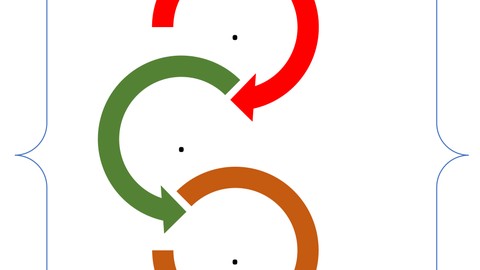
Develop Micro-Services API via Test Driven Development
Develop Micro-Services API via Test Driven Development, available at $39.99, has an average rating of 3.2, with 23 lectures, based on 18 reviews, and has 124 subscribers.
You will learn about Test Driven Development way of writing Micro-Services. The complete journey of Acceptance test, Integration test, unit test has been demonstrated, which would help you to master Test driven development (TDD). This course lay emphasis on Designing and coding the medium to complex story in working micro-service APIs via TDD & BDD as well as advance concepts to design a test for mocking API call with Junit, wire-mock, MockBean and MockMvc. The concept and use of Swagger file in developing the app. The bonus lecture on how to create rest-assured based AUTOMATED TESTING TO TEST Micro-service API as user. This course is ideal for individuals who are Freshers or experienced Software Developer. or Working Java professionals who want to acquire TDD skills. or Java beginners who are curious about TDD and BDD way of writing quality software. It is particularly useful for Freshers or experienced Software Developer. or Working Java professionals who want to acquire TDD skills. or Java beginners who are curious about TDD and BDD way of writing quality software.
Enroll now: Develop Micro-Services API via Test Driven Development
Summary
Title: Develop Micro-Services API via Test Driven Development
Price: $39.99
Average Rating: 3.2
Number of Lectures: 23
Number of Published Lectures: 23
Number of Curriculum Items: 23
Number of Published Curriculum Objects: 23
Original Price: £19.99
Quality Status: approved
Status: Live
What You Will Learn
- Test Driven Development way of writing Micro-Services. The complete journey of Acceptance test, Integration test, unit test has been demonstrated, which would help you to master Test driven development (TDD).
- This course lay emphasis on Designing and coding the medium to complex story in working micro-service APIs via TDD & BDD as well as advance concepts to design a test for mocking API call with Junit, wire-mock, MockBean and MockMvc. The concept and use of Swagger file in developing the app.
- The bonus lecture on how to create rest-assured based AUTOMATED TESTING TO TEST Micro-service API as user.
Who Should Attend
- Freshers or experienced Software Developer.
- Working Java professionals who want to acquire TDD skills.
- Java beginners who are curious about TDD and BDD way of writing quality software.
Target Audiences
- Freshers or experienced Software Developer.
- Working Java professionals who want to acquire TDD skills.
- Java beginners who are curious about TDD and BDD way of writing quality software.
Micro-Service API development via Test Driven Development (TDD) or Design By Test (DBT) course focuses on how to write production code for Micro service APIs in spring boot. This course lay emphasis on Designing and coding the medium to complex story in working micro-service APIs via TDD & BDD as well as advance concepts to design a test for mocking API call with Junit, wire-mock and MockMvc.
The basics knowledge of java is added advantage but not the requirement to understand the Design by Test concepts.
The flow of the course takes you with ease to demonstrate and make you understand about the beauty of how test dictates the production code.
The complete journey of Acceptance test, Integration test, unit test has been demonstrated, which would help you to master TDD.
The bonus session on how to create AUTOMATED TESTINGTO TEST Micro-service API as user via REST-ASSURED.
Course Curriculum
Chapter 1: Introduction
Lecture 1: Introduction – About the course
Chapter 2: What & why MicroService?
Lecture 1: What Is Micro-Service & API
Chapter 3: Problem Statement or story about application.
Lecture 1: Story or Problem Statement about application to be developed in Micro-service
Chapter 4: Pre-requirement
Lecture 1: Pre-requirement or machine/environment setup
Chapter 5: Key Coding Activity
Lecture 1: About the coding activity – Hands on
Chapter 6: Contract First : Swagger
Lecture 1: Creation of Swagger File and Code Generation via maven plugins
Chapter 7: Behavioural Driven Development
Lecture 1: Acceptance Criteria – Cucumber feature file
Chapter 8: BDD – Glue and Step Definitions
Lecture 1: Cucumber Step Definitions glue creation
Chapter 9: Rest Controller Integration Test – Part 1
Lecture 1: MockMvc and Edge Cases of RestController
Chapter 10: Rest Controller Integration Test – Part 2
Lecture 1: RestController Acceptance Criteria
Chapter 11: Overview of Service Implementation
Lecture 1: Service Business Logic Test Approach Explained
Chapter 12: Service Implementation – Hands On
Lecture 1: Service Business Logic Test Design
Chapter 13: Rest Template
Lecture 1: RestTemplate Bean Creation
Chapter 14: Refactor – An Overview
Lecture 1: Refactor – Red -Green-Refactor
Chapter 15: Code Refactor – Hands On
Lecture 1: Code Refactoring
Chapter 16: Exception Handling
Lecture 1: Exception Handling Acceptance Criteria
Chapter 17: Edge Cases Service Implementation
Lecture 1: Edge Case for Service Implementation
Chapter 18: Revisit RestController Test
Lecture 1: Revisit RestController Integration Test
Chapter 19: ResponseEntityExceptionHandler
Lecture 1: Controller Advisor – ResponseEntityExceptionHandler
Chapter 20: Famous Error – Address Already In Use
Lecture 1: Address Already In Use – Tips
Chapter 21: Wire-Mock in Cucumber
Lecture 1: Wire-Mock- In BDD Step Definition to mock 3rd Party Api Call in Service
Chapter 22: Automation Testing- Rest-Assured
Lecture 1: API Automation Testing
Chapter 23: Further Reference & Study Materials
Lecture 1: Full Stack Developer – Further Study Material
Instructors
-
Satender Kumar Mall
Full Stack Developer
Rating Distribution
- 1 stars: 2 votes
- 2 stars: 1 votes
- 3 stars: 4 votes
- 4 stars: 4 votes
- 5 stars: 7 votes
Frequently Asked Questions
How long do I have access to the course materials?
You can view and review the lecture materials indefinitely, like an on-demand channel.
Can I take my courses with me wherever I go?
Definitely! If you have an internet connection, courses on Udemy are available on any device at any time. If you don’t have an internet connection, some instructors also let their students download course lectures. That’s up to the instructor though, so make sure you get on their good side!
You may also like
- Top 10 Content Creation Courses to Learn in December 2024
- Top 10 Game Development Courses to Learn in December 2024
- Top 10 Software Testing Courses to Learn in December 2024
- Top 10 Big Data Courses to Learn in December 2024
- Top 10 Internet Of Things Courses to Learn in December 2024
- Top 10 Quantum Computing Courses to Learn in December 2024
- Top 10 Cloud Computing Courses to Learn in December 2024
- Top 10 3d Modeling Courses to Learn in December 2024
- Top 10 Mobile App Development Courses to Learn in December 2024
- Top 10 Graphic Design Courses to Learn in December 2024
- Top 10 Videography Courses to Learn in December 2024
- Top 10 Photography Courses to Learn in December 2024
- Top 10 Language Learning Courses to Learn in December 2024
- Top 10 Product Management Courses to Learn in December 2024
- Top 10 Investing Courses to Learn in December 2024
- Top 10 Personal Finance Courses to Learn in December 2024
- Top 10 Health And Wellness Courses to Learn in December 2024
- Top 10 Chatgpt And Ai Tools Courses to Learn in December 2024
- Top 10 Virtual Reality Courses to Learn in December 2024
- Top 10 Augmented Reality Courses to Learn in December 2024






















